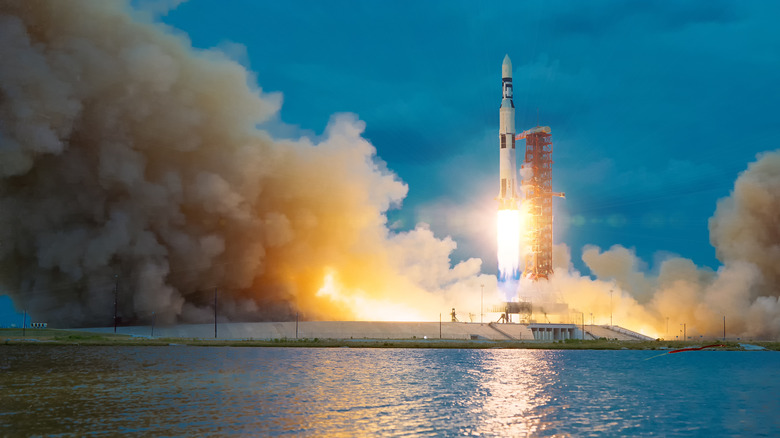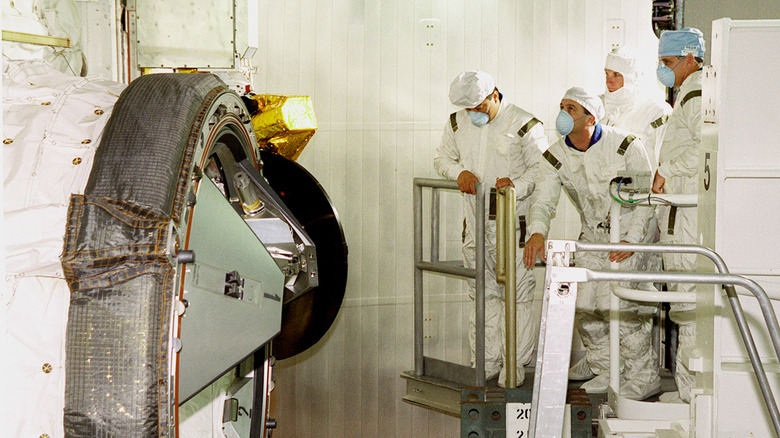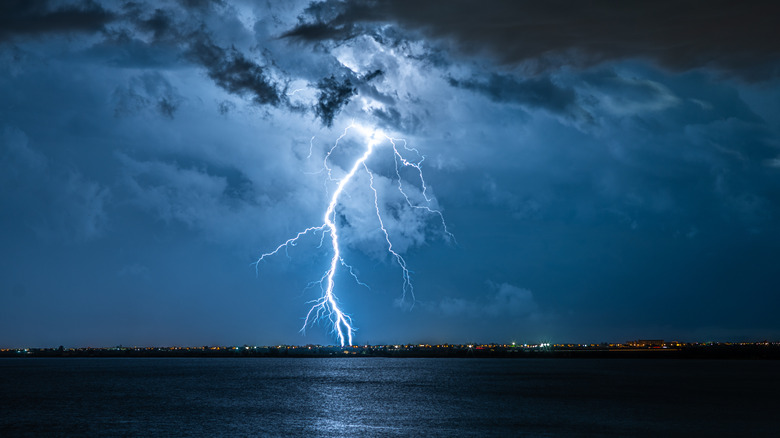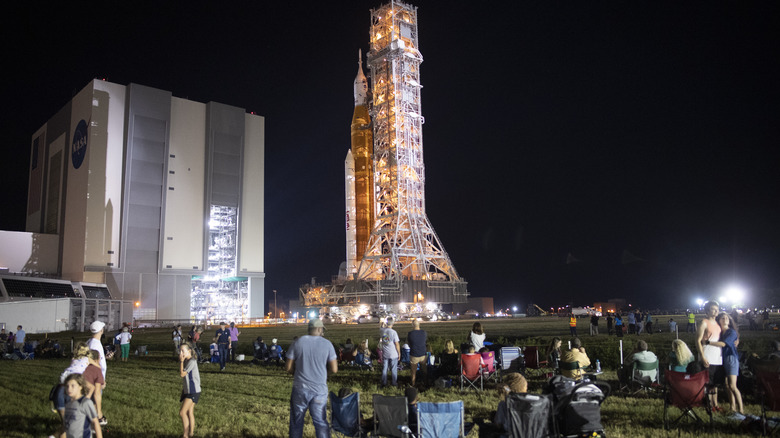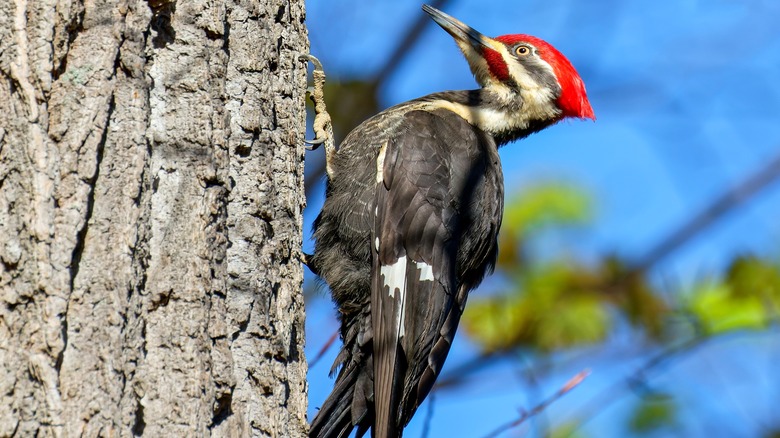Why Would A Rocket Launch Get Scrubbed?
There were more rocket launches in 2021 than any other year in history, with 135 successful launches and 11 failed ones (via Space Flight Now). And the first half of 2022 continues that rapid pace — 72 rockets have blasted off into space so far. But with all of these exciting launches, it's fairly common to hear that a rocket actually won't be blasting off as planned, sometimes for a seemingly trivial reason. It happened once again in August 2022 (per The Washington Post), when a rocket launch was postponed — or "scrubbed" — due to engine problems. So what is a scrubbed launch, and why do they seem to happen so frequently?
Having rocket launches get scrubbed is definitely not a new thing. In fact, it's so common that the Kennedy Space Center has an entire webpage dedicated to explaining how rocket launches are rescheduled so that guests can return to watch them. At this space center, launches are usually rescheduled within three days.
Rocket sensors help to avoid disasters
There are endless reasons why scrubs happen, and some are more serious than others. The launch conditions for the rocket need to be as perfect as possible, especially after tragic accidents like the 1967 Apollo 1 crash, which killed the three astronauts onboard, per Popular Science.
According to the Kennedy Space Center, it costs millions of dollars to build each rocket, and hundreds of people can spend years building a single craft. So extreme caution has to be taken at every step of the way to ensure everyone's safety and get the best possible chance to launch the rocket into outer space. WTSP reports that every rocket has thousands of sensors to indicate if something has gone awry. Launches have been scrubbed for even a single sensor that alerts the crew to a hazard. As a spokesperson for NASA, Allard Beutel, said (via Space.com), "Nobody wants to waste any money. But those decisions made to not launch were for safety reasons and not for cost reasons."
So what are the perfect launch conditions? First of all, the weather has to be really, really good. The United States Air Force has a special squadron that measures the weather before each launch. After all, in 1986, a rocket blasted off in inclement weather and was zapped by a lightning bolt, ending the launch.
Lightning is a bigger problem than you might think
Lightning is a big problem for rockets since they can actually generate their own lightning bolts as they take off (via WTSP). A stray bolt could knock the rocket off its path and send it hurtling towards the ground outside of the hazard zone, where it could harm civilians. That actually happened during one 1987 launch, when NASA was forced to blow up a rocket that had been affected by lightning and knocked off course. Luckily, they blew it to smithereens before it could fall on civilians and buildings below. Nowadays, out of an abundance of caution, lighting is one of the leading causes of rocket scrubs. In the last half-hour before liftoff, there can't be a single lightning strike within 10 nautical miles of the launch site. These pesky lightning bolts are responsible for 30 percent of weather delays.
The Kennedy Space Center reports that extreme cold, strong gusts of wind, too many clouds, or storms passing through can all result in a scrub date. Per WTSP, strong winds can "shear" a rocket as it launches, so if winds are more brisk than 35 miles per hour at liftoff time, don't expect to see that rocket fly. Although cloudy conditions don't sound hazardous to a powerful rocket, they're actually a real issue, too. Some cloud layers are 4,500 feet thick, which can create frigid temperatures that rocketships can't handle.
It costs more than $1 million to reschedule
According to Space.com, scrubs can be mighty expensive when they do happen — a rescheduled rocket launch costs NASA roughly $1.2 million. NASA uses fuel made of liquid hydrogen and liquid oxygen, and they need a special team of staffers to fuel up the rockets. Most of the gas that was poured into the rocket can be reused during the next launch, but NASA still sometimes loses up to $500,000 in fuel costs. Then, they still have to pay their special team to fuel up the engines a second time, which can cost upward of $700,000.
And just like we experience fluctuations at the gas pump each time we fill our cars' fuel tanks, the price of NASA's fuel prices fluctuate too. The cost of the launch even varies depending on if the rocket blasts off on a weekend or weekday. Luckily, they have a big enough budget to cover such occurrences. Per Insider, one pervasive way that launches are delayed is due to boats that enter the hazard zone surrounding the launch site.
The fishing tournament that caused a scrubbed launch
The hazard zone around rockets can be quite large, according to Insider. For some launches, 40 miles of space is needed to ensure a safe blastoff. One 2022 Cape Canaveral SpaceX launch demarcated a rectangle spreading 75 miles from the shoreline as the hazard zone.
Per Insider, in 2000, a launch was put on pause because it coincided with a fishing tournament. The fishers were unaware that they were in restrictive waters, and NASA called off the launch. It doesn't even take a whole fleet of ships to stop a rocket from liftoff — in October 2014, NASA halted a launch because a sailboat drifted into the hazard zone. It was 40 miles away from the launch site, but NASA still deemed the launch too dangerous to attempt and had to reschedule. In case you were wondering, Space Flight Now reports that people who cause a rocket launch delay can be fined or arrested.
People and animals can both interfere
In January 2022, a SpaceX rocket launch was scrubbed in the very final seconds of the launch, as Forbes reported. A cruise ship drifted into the hazard zone in the Florida waters just over 30 seconds before Falcon 9 was ready to launch, and the 2022 Cape Canaveral launch was called off. It was rescheduled for the next day.
It's not just weather issues and boats that halt rocket launches. According to Insider, there are thousands of aircraft in the skies, and NASA has to time the launches perfectly to ensure everyone's safety. Sometimes planes will accidentally fly into the hazard zone, and they'll be told to move, but even so, this can still trigger a scrub situation.
Maybe the cutest reason for delaying a liftoff, however, is a woodpecker who chose to peck upon a rocket's fuel tank, according to the Kennedy Space Center. The woodpecker managed to peck 200 holes into an external fuel chamber, which of course, caused the launch to be scrubbed.
